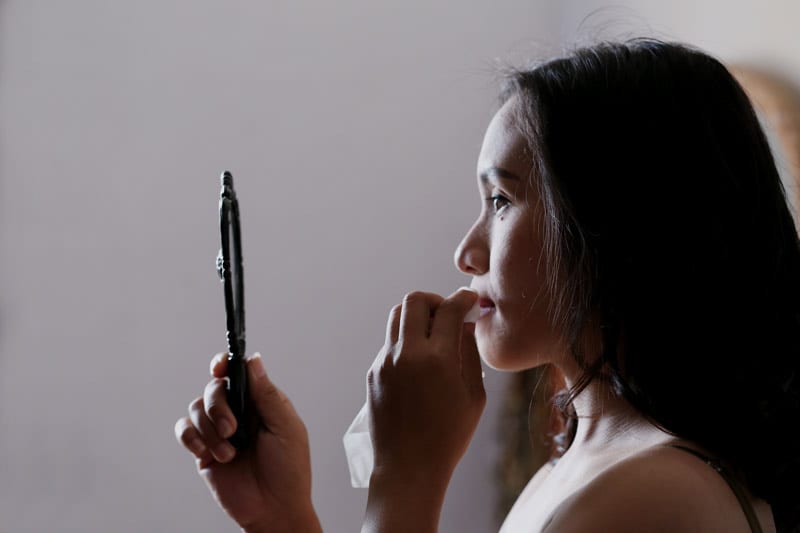As you may know, acne is a common skin disease experienced mostly by teens and young adults. And in the majority of people, the skin disorder would clear after a couple of years – usually from late teens to early 20s.
However, what you may not know is that aside from the scarred face – which hopefully clears after a while – acne has a more subtle, deeper impact on the sufferer. Its effects are not only deep skin, as most people would believe. Cases of severe acne can have a devastating, non-physical impact.
Acne can trigger depressive tendencies
When you consider that over 80 percent of acne sufferers are impressionable teens and young adults who are at the verge of discovering themselves, building self-esteem, and developing vital social skills necessary to function effectively in society, you will appreciate just how much psychological damage acne can do to the sufferer.
Researchers have found that teenagers, especially girls, experiencing an acne outbreak are more likely to become depressed. At the root of this depression according to the study is teens’ need to be accepted. Remember, during this stage, they are under intense pressure to gain the approval of their peers. And as study after study has shown, there is a strong connection between attractiveness, physical appearance, and peer status.
So you can imagine what it’s like for the impressionable teenager, eager to feel accepted by her friends, whose skin is suddenly ridden with acne. Dermatologists understand the immense pressure these kids are under and the risk for them to get depressed. If the outbreak is severe, they may recommend mental health therapy in addition to treating the skin condition. This way, the acne sufferers get an all-encompassing integrated treatment that involves getting rid of blemishes on their skin plus guidance to a healthier mental state.
Acne can lead to low self-esteem
Depression is just one out of the several adverse effects of acne. People suffering from a severe outbreak also struggle with low self-esteem and poor body image.
Here’s the thing, you are attached to your face, your looks, and even if you don’t acknowledge it, at some subconscious level, you are concerned about how others perceive you. And it doesn’t help one bit to have spotty, scarred, dark blemishes scattered across your face.
It is not surprising then to see many acne patients suffer from chronic low self-esteem. Their poor body image manifests in different forms. For instance, an embarrassed acne sufferer could develop the habit of avoiding eye contact. Or grow long hair just to hide their skin condition. Girls often use heavy makeup to cover up their acne breakouts even when they know it could aggravate the problem.
And in certain situations the skin disorder prevents young people from playing sports like swimming since it would mean exposing their skin in public.
It can cause social withdrawal
Social withdrawal is another adverse effect of acne on teenagers. Often, especially in middle and high school, students with acne are exposed to cruel psyche-shattering taunts from others. These taunts if not nipped in the bud could ultimately lead a person with acne to withdraw from all forms of social interactions.
Also, the individual may find it difficult to develop new relationships with others, especially with the opposite sex. This could be the result of a lack of self-confidence. A young person might also become shy, reclusive, and in extreme cases, develop a social anxiety disorder.
It can impact negatively on education and work
Not only do young people with acne have to struggle with the physical and psychological effects of the skin ailment. The impact often also spills over into their work and/or academics.
It is common to see teenagers with the skin condition skip school as a result of bullying and bad jokes from their peers. Some take time off from work for days, even when they know it could mean losing their source of livelihood.
And for some young people, their career choices are limited. For instance, people experiencing acne breakouts can’t take up a modeling career since the job depends largely on their appearance and how attractive they are judged to be.
Also, research has found that acne sufferers are less successful with job hunting compared to people who do not have acne. This finding, according to studies is in part due to the lack of self-confidence among some sufferers. And as is often the case, potential employers can tell from a mile away whether applicants are confident in their ability to get the job done or not.
In conclusion, acne though, a physical ailment can cause far-reaching emotional damage to a teen. These effects, if not identified early on, can stay with the individual for a long time even after the breakout has been treated. Early treatment, for the skin disorder and its secondary emotional impact, can help to minimize the damage to teens’ self-esteem and mental health.
Author Bio: Palwinder is a freelance content writer and a blogger with years of experience in writing for myriad niche businesses involving their content marketing strategies especially for the renowned rejuvenation center, BHRC.
Photo by Septian simon on Unsplash
The opinions and views expressed in this guest blog do not necessarily reflect those of www.rtor.org or its sponsor, Laurel House, Inc. The author and www.rtor.org have no affiliations with any products or services mentioned in this article or linked to herein.
Recommended for You
- How a Health Cleanse Can Reset Your Body and Mind - April 16, 2025
- The Truth about Relapse in Addiction Recovery - April 14, 2025
- The Power of Peer Support in Mental Health Recovery - April 10, 2025





